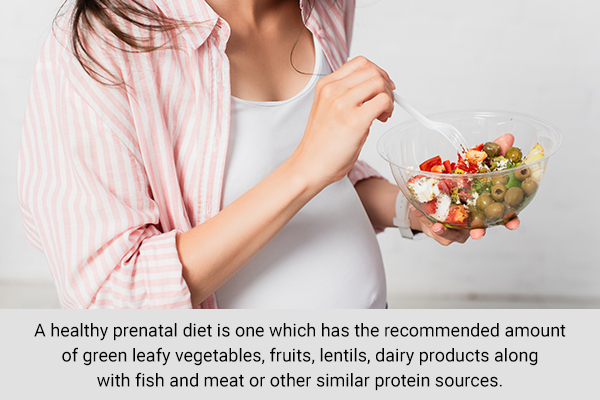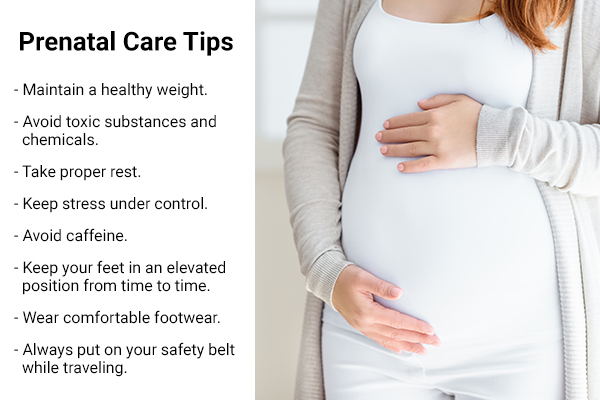In this article:
You are on your way to one of the most important journeys that women embark on- Motherhood.

This beautiful journey begins on the day your pregnancy is confirmed and from thereon, it is a rollercoaster ride of emotions, some nervousness, and of course, exhilaration and simply a wondrous joy!
The first thing that you need to do as soon as your home pregnancy test gives you a happy plus sign is to schedule an appointment with your doctor/midwife.
The importance of proper prenatal care (i.e., care before the birth of your tiny bundle of joy) cannot be emphasized enough. It is crucial for both your health and for your baby’s health as well.
Ideally, prenatal care needs to be started at least 3 months before you begin trying to conceive. Once you become pregnant, it becomes even more important of course.
Important Prenatal Care Tips for Pregnant Mothers
Here are some important prenatal care tips that every mother-to-be should know.
1. Do not take any stress
Stress is very harmful both to you and your baby. It can have an adverse effect on your baby’s health as well as weight.
A study published in the American Journal of Obstetrics and Gynecology investigated the association between prenatal stress and infant birth weight and gestational age at birth. It found that prenatal stress is significantly associated with both infant birth weight and gestational age at birth. (1)
Another study published in the Journal of the American Academy of Child & Adolescent Psychiatry stated that maternal stress during pregnancy affects cognition and behavioral fearfulness in infants. (2)
2. Visit your doctor/midwife regularly

Never miss any of your appointments with the doctor/midwife when you are pregnant. There will be several prenatal visits before your due date, to ensure that both you and your baby are as healthy as can be.
Women who do not take appropriate prenatal care are exposed to a greater risk for adverse pregnancy outcome. And this risk cannot be attributed only to unfavorable living conditions. (3)
Typically, you will be required to visit your doctor or midwife every month during the first six months of pregnancy, and then every two weeks in the seventh and eighth months, and finally every week during your ninth month.
During these visits, your doctor will check both your and your baby’s health by monitoring your blood pressure, measuring your weight gain, and monitoring the baby’s growth and heart rate. Your doctor may also do routine tests and screenings, such as a blood test to check for anemia.
When visiting your healthcare provider, feel free to talk about your health problems or concerns. They are there to help answer questions about your pregnancy and upcoming childbirth.
3. Take your supplements
During the prenatal stage, your doctor may prescribe certain supplements. These supplements are vital, and you should take them as directed.
During pregnancy, your body needs a lot of nutrients that a typical healthy diet cannot meet. Typically, folic acid, prenatal vitamins, and occasionally iron supplements are prescribed.
Reviews in Obstetrics & Gynecology (2011) published a study suggesting folic acid supplement even before pregnancy protects against fetal structural anomalies, including neural tube and congenital heart defects. Several referenced studies in the article also indicate lower blood levels of folate are associated with preterm birth (less than 37 weeks of pregnancy).
This suggests that regularly taking folic acid before and during pregnancy may protect against these complications. (4)
Researchers at the UC Davis MIND Institute published in Epidemiology (2011) evidence that women who did not take a daily prenatal vitamin immediately before and during the first month of pregnancy were nearly twice as likely to have a child with an autism spectrum disorder as compared to women who did take the supplements. (5)
Prenatal vitamins are also important to supplement the mother and fetus with those daily nutritional needs that are otherwise difficult to get through the diet alone.
Women can sometimes be anemic or have a low iron level, which leads to fatigue or other more severe complications in the pregnancy. The mom-to-be can become more prone to infections and can have an increased chance of a low birth-weight baby. (6)
For this reason, it is important to take any iron supplements recommended by your doctor or midwife to prevent complications.
These are only a few examples of why taking supplements as prescribed by your doctor or midwife is so important. It is also not advised to take over-the-counter medications or herbal remedies without first consulting your doctor.
4. Eat a healthy diet

Early research suggests that the food that you eat during pregnancy can affect your child’s health even decades later. (7) Your diet plan should support your growing baby and his or her health.
A healthy prenatal diet needs to fulfill all your body’s nutritional requirements as well as those of the fetus. This healthy diet supports the normal birth weight, improves fetal brain development, and reduces the risk of many congenital disabilities. (7)(8)
The healthy prenatal diet is one which has the recommended amount of green leafy vegetables, fruits, lentils, dairy products along with fish and meat or other similar protein sources.
A well-rounded diet ensures that you and your baby get the protein, vitamin C, calcium, iron, and adequate healthy fats that are needed in this crucial time of fetal growth.
Eating in moderation is always part of a healthy lifestyle, but it is especially more important during pregnancy. Overeating during pregnancy may increase your risk of having a cesarean section, getting preeclampsia, or increase the risk of stillbirth. (9)
It is important to get enough nutrition; however, you are not eating for two as many have mistakenly thought in the past. It is best to follow the diet plan suggested by your doctor or midwife.
Along with a good diet, keep your water intake healthy. Dehydration is very common during pregnancy and may cause the mother to be susceptible to urinary tract infections (UTI) or preterm labor (10) which can negatively affect the baby or put the pregnancy at risk. Along with plain water, you can enjoy coconut water, barley water, or fruit-and-herb infused water.
Choose these hydrating options in place of those high in sugar content or caffeine-infused drinks.
There is conflicting evidence which has mothers-to-be concerned about too much caffeine intake. Studies suggest that the risk for miscarriage and fetal growth retardation (IUGR) increases only with daily doses of caffeine above 150mg/d. (11)
Caffeine can also impact overall hydration; so it is safer to avoid caffeine in high doses during pregnancy.
5. Keep a pack of crackers by your bed
Crackers can be a boon for mothers-to-be suffering from morning sickness. They help soothe an unsettled stomach and relieve the feeling of queasiness. Most mothers find these especially helpful to have even before getting out of bed in the morning.
A 2010 study published in the International Journal of Women’s Health notes that simple dry carbohydrates like the ones found in crackers and biscuits before getting out of bed in the morning can help control morning sickness. (12)
Being high in starch, crackers help absorb excess gastric acid that contributes to feelings of nausea and vomiting. They are easy on the stomach because they are bland and quite easy to digest.
Eat a few crackers in the morning as soon as you get up to help prevent morning sickness; an empty stomach can worsen your nausea. Also, avoid triggers such as strong smells and foods that make you feel queasy.
6. Quit smoking

As soon as you plan to become pregnant or find out that you are pregnant, you need to quit smoking. Even if you’re not a smoker, stay away from secondhand smoke. (13)
When you smoke, you inhale poisons like nicotine, lead, arsenic, and carbon monoxide. These poisons get into the placenta and ultimately cause harm to the fetus.
During pregnancy, smoking increases the risk of miscarriage, growth problems, placental abruption, and premature delivery. It also increases the chance that the baby may be stillborn or die in infancy. (14)
The evidence in one 2013 study published in PLOS ONE indicates that maternal smoking is associated with reduced growth of fetal brain, lungs, and kidneys. Also, fetuses exposed to maternal smoking are smaller in size. (14)
Additionally, The Asian Journal of Andrology published a study’s findings that prenatal exposure to cigarette smoking may cause some long-term adverse effects on the child’s reproductive health in adulthood. (14)
7. Say no to alcohol
Like smoking, it is important to stay away from alcohol while you’re pregnant to avoid complications for the growing baby. The American College of Obstetricians and Gynecologists (ACOG) and the Centers for Disease Control and Prevention (CDC) both recommend women to abstain from drinking alcohol during pregnancy.
Any amount of alcohol you drink reaches your baby rapidly through your bloodstream and placenta and can have significant effects on your baby and pregnancy.
In fact, drinking can increase your odds of having a baby with low birth weight, while also increasing your risk of miscarriage and stillbirth. (15)
Prenatal exposure to moderate weekly doses of alcohol and binge drinking episodes are associated with lower scores on children’s grapho-motor skills as measured by the Draw-a-Person Intellectual Ability Test for children, adolescents, and adults. (16)
For these reasons, healthcare professionals continue to recommend abstinence from alcohol during pregnancy as the safest measure to have a healthy pregnancy and baby.
8. Continue exercising
Whether you are pregnant or planning to be, regular exercise is important for your health. Exercise is even more important during the prenatal stage.
A good exercise routine will ensure that you have all the strength and endurance to carry the weight you gain during pregnancy. It also helps to prevent or ease aches and pains, improve blood circulation in your legs, and help your body handle the physical stress of labor.
Plus, if you’re in the habit of exercising, it will be easier for you to get back into shape after delivery.
A 2016 study published in Clinical Medicine Insights: Women’s Health reports that regardless of income or socioeconomic status, exercise during pregnancy is associated with increased incidence of full-term delivery. They state that exercise during pregnancy also decreases the risk of chronic disease for both the mother and child. (17)
The American Journal of Obstetrics & Gynecology (ACOG) recommends regular exercise, stating that pregnant women who exercised were less likely to have back pain or constipation. They showed a reduced risk of gestational diabetes, preeclampsia, and cesarean delivery, as well as improvement in overall fitness; strengthening the heart and blood vessels while promoting weight loss after birth. (18)
From yoga and pelvic floor exercises to swimming and brisk walking, there are many exercises that can help you stay active and fit during pregnancy. However, before starting any new exercise, always consult your doctor.
Some Other Important Tips

- Keep an eye on your weight gain, as too much weight gain can affect your baby’s health and cause complications in pregnancy.
- Avoid contact with toxic substances and chemicals at home or work.
- Always listen to your body and take short naps during the daytime. Try to get a good amount of sleep at night.
- Use relaxation techniques like yoga, stretching, deep breathing, and massage to combat stress.
- Cut back on caffeine by switching to green tea.
- Wear comfortable shoes and put your feet up several times a day to prevent fatigue and swelling of the feet, legs, and ankles.
- Always wear a safety belt while riding in motor vehicles and sit as far from the airbag as possible while pregnant.
Final Word
Prenatal care involves a routine health evaluation, prenatal education and any necessary medical treatment to improve the chances of a healthy pregnancy, labor and delivery of a healthy baby.
Regular prenatal visits reduce the risks of complications during pregnancy. It allows your doctor/midwife to identify any problems or complications before they become serious. (19)
- Was this article helpful?
- YES, THANKS!NOT REALLY


